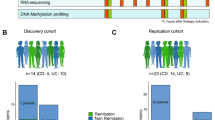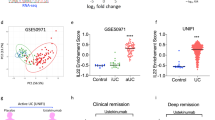Abstract
Background
While monoclonal antibodies against tumor necrosis factor-α (TNFα) are effective in treating Crohn’s disease (CD), approximately one-third of patients lose response. The mechanisms underlying this loss of response remain elusive.
Aim
We sought to determine if novel biological pathways, including TNFα-independent inflammatory pathways, emerge in those with loss of response to anti-TNFα.
Methods
Using RNA microarray technology in 28 patients with CD, we examined the colonic gene expression differences between those with active inflammation in the setting of loss of response to TNFα-antagonist therapy (“loss of responders”) compared to anti-TNFα naïve patients with active inflammation and those on anti-TNF therapy in disease remission. Pathway enrichment analyses were performed.
Results
We found that colonic expression of chemokines known to drive inflammation (CXCL20, CXCL9, and CXCL10) was elevated in those with loss of response compared to those in remission. Expression of genes critical to modulating oxidative stress burden (DUOX2, DUOXA2, and NOS2) was also elevated. Additionally, MMP3, MMP1, and MMP12 were elevated in those with continued inflammation. Gene enrichment analysis revealed that loss of responders exhibited dysregulation in the cysteine and methionine metabolism pathway, suggesting alteration in oxidative stress burden. There were no differences in genes or pathways between loss of responders and those who were TNFα-naïve. However, loss of response occurred despite the ability of anti-TNFα therapy to normalize APO gene expression.
Conclusion
Our analyses suggest that loss of response to anti-TNFα is not driven by the emergence of pathways that bypass the action or induce resistance to anti-TNFα therapy.


Similar content being viewed by others
References
Hanauer SB, Feagan BG, Lichtenstein GR, et al. Maintenance infliximab for Crohn’s disease: the ACCENT I randomised trial. Lancet. 2002;359:1541–1549.
Colombel JF, Sandborn WJ, Rutgeerts P, et al. Adalimumab for maintenance of clinical response and remission in patients with Crohn’s disease: the CHARM trial. Gastroenterology. 2007;132:52–65.
Sandborn WJ, Feagan BG, Stoinov S, et al. Certolizumab pegol for the treatment of Crohn’s disease. N Engl J Med. 2007;357:228–238.
Gisbert JP, Panes J. Loss of response and requirement of infliximab dose intensification in Crohn’s disease: a review. Am J Gastroenterol. 2009;104:760–767.
Sandborn WJ, Hanauer SB, Rutgeerts P, et al. Adalimumab for maintenance treatment of Crohn’s disease: results of the CLASSIC II trial. Gut. 2007;56:1232–1239.
Sandborn WJ, Feagan BG, Stoinov S, et al. Certolizumab pegol for the treatment of Crohn’s disease. N Engl J Med. 2007;357:228–238.
Roblin X, Rinaudo M, Del Tedesco E, et al. Development of an algorithm incorporating pharmacokinetics of adalimumab in inflammatory bowel diseases. Am J Gastroenterol. 2014;109:1250–1256.
Allez M, Karmiris K, Louis E, Van Assche G, Ben-Horin S. Report of the ECCO pathogenesis workshop on anti-TNF therapy failures in inflammatory bowel diseases: definitions, frequency and pharmacological aspects. J Crohns Colitis. 2010;4:355–366.
Chowers A, Sturm A, Sans M, Papadakis K. Report of the ECCO workshop on anti-TNF therapy failures in inflammatory bowel diseases: biological roles and effects of TNF and TNF antagonists. J Crohns Colitis. 2010;4:367–376.
Harrison MJ, Dixon WG, Watson KD, et al. Rates of new-onset psoriasis in patients with rheumatoid arthritis receiving anti-tumour necrosis factor alpha therapy: results from the British Society for Rheumatology Biologics Register. Ann Rheum Dis. 2009;68:209–215.
Palucka AK, Blanck JP, Bennett L, Pascual V, Banchereau J. Cross-regulation of TNF and IFN-alpha in autoimmune diseases. Proc Natl Acad Sci USA. 2005;102:3372–3377.
Subramanian A, Tamayo P, Mootha VK, et al. Gene set enrichment analysis: a knowledge-based approach for interpreting genome-wide expression profiles. Proc Natl Acad Sci USA. 2005;102:15545–15550.
Marafini I, Monteleone I, Dinallo V, et al. CCL20 is negatively regulated by TGF-β1 in intestinal epithelial cells and reduced in Crohn’s disease patients with a successful response to mongersen, a Smad7 antisense oligonucleotide. J Crohns Colitis. 2017;11:603–609.
West NR, Hegazy AN, Owens BMJ, et al. Oncostatin M drives intestinal inflammation and predicts response to tumor necrosis factor-neutralizing therapy in patients with inflammatory bowel disease. Nat Med. 2017;23:579–589.
Alge-Priglinger CS, Kreutzer T, Obholzer K, et al. Oxidative stress-mediated induction of MMP-1 and MMP-3 in human RPE cells. Invest Ophthalmol Vis Sci. 2009;50:5495–5503.
Biancheri P, Brezski RJ, Di Sabatino A, et al. Proteolytic cleavage and loss of function of biologic agents that neutralize tumor necrosis factor in the mucosa of patients with inflammatory bowel disease. Gastroenterology. 2015;149:1564–1574.
Gyuraszova M, Kovalcikova A, Gardlik R. Association between oxidative status and the composition of intestinal microbiota along the gastrointestinal tract. Med Hypotheses. 2017;103:81–85.
Haberman Y, Tickle TL, Dexheimer PJ, et al. Pediatric Crohn disease patients exhibit specific ileal transcriptome and microbiome signature. J Clin Invest. 2014;124:3617–3633.
Pink AE, Fonia A, Allen MH, et al. Antinuclear antibodies associate with loss of response to antitumour necrosis factor-alpha therapy in psoriasis: a retrospective, observational study. Br J Dermatol. 2010;162:780–785.
Brandse JF, van den Brink GR, et al. Loss of Infliximab into feces Is associated with lack of response to therapy in patients with severe ulcerative colitis. Gastroenterology. 2015;149:350–355.
Kong JY, Bundell C, Pawlik J, et al. Low trough serum infliximab and antibodies to infliximab in smokers. Inflamm Bowel Dis. 2013;19:E35–E36.
Ben-Horin S, Kopylov U, Chowers Y. Optimizing anti-TNF treatments in inflammatory bowel disease. Autoimmun Rev. 2014;13:24–30.
Funding
5K23DK103119 to MG, Crohn’s and Colitis Foundation senior research award and AGA Elsevier pilot award to ANA, P30 DK043351 to RJX.
Author information
Authors and Affiliations
Corresponding author
Ethics declarations
Conflict of interest
SJP have equity interest in Heprotech Inc. MG has equity interest in New Amsterdam Genomics. Ananthakrishnan has served on the scientific advisory boards for Gilead, Takeda, and Abbvie. All other authors have no conflicts to declare.
Rights and permissions
About this article
Cite this article
Luther, J., Gala, M., Patel, S.J. et al. Loss of Response to Anti-Tumor Necrosis Factor Alpha Therapy in Crohn’s Disease Is Not Associated with Emergence of Novel Inflammatory Pathways. Dig Dis Sci 63, 738–745 (2018). https://doi.org/10.1007/s10620-018-4932-8
Received:
Accepted:
Published:
Issue Date:
DOI: https://doi.org/10.1007/s10620-018-4932-8




